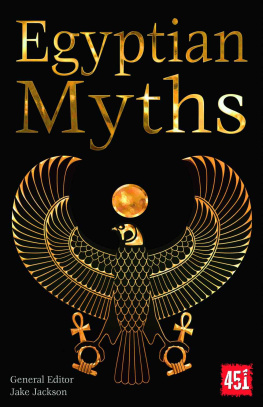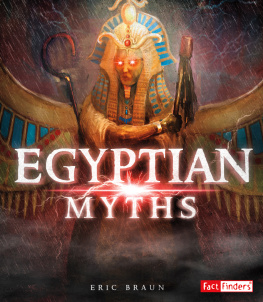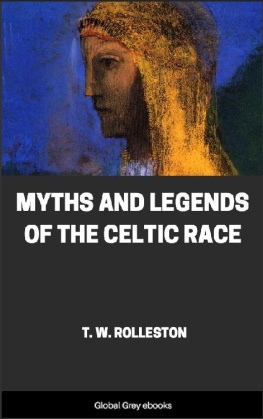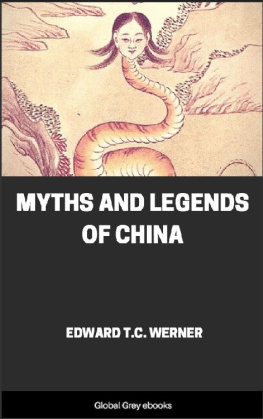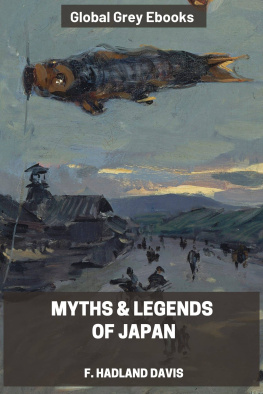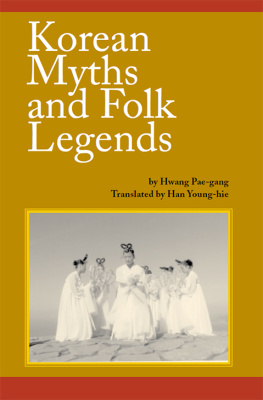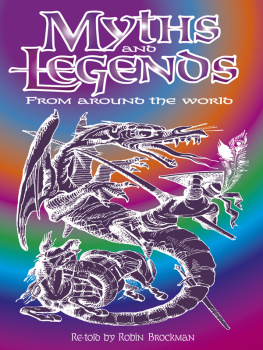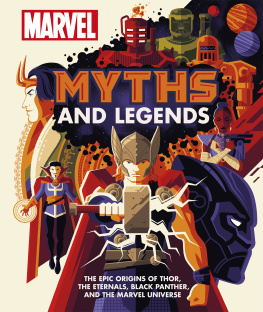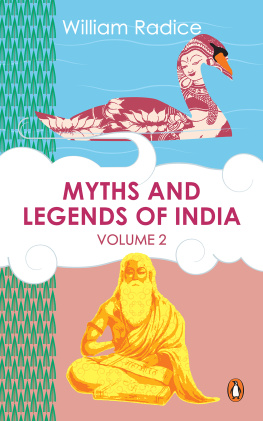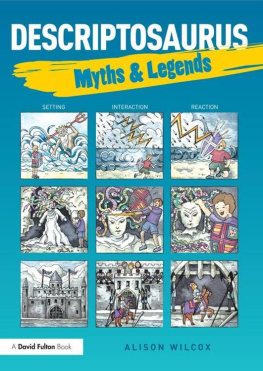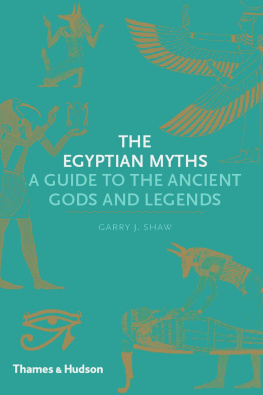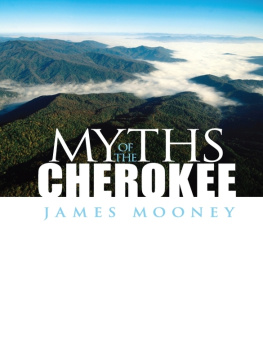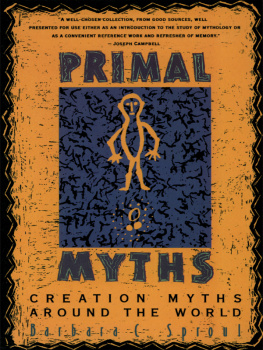Flame Tree Studio - Egyptian Myths (The Worlds Greatest Myths and Legends)
Here you can read online Flame Tree Studio - Egyptian Myths (The Worlds Greatest Myths and Legends) full text of the book (entire story) in english for free. Download pdf and epub, get meaning, cover and reviews about this ebook. year: 2018, publisher: Flame Tree Publishing, genre: Religion. Description of the work, (preface) as well as reviews are available. Best literature library LitArk.com created for fans of good reading and offers a wide selection of genres:
Romance novel
Science fiction
Adventure
Detective
Science
History
Home and family
Prose
Art
Politics
Computer
Non-fiction
Religion
Business
Children
Humor
Choose a favorite category and find really read worthwhile books. Enjoy immersion in the world of imagination, feel the emotions of the characters or learn something new for yourself, make an fascinating discovery.
- Book:Egyptian Myths (The Worlds Greatest Myths and Legends)
- Author:
- Publisher:Flame Tree Publishing
- Genre:
- Year:2018
- Rating:4 / 5
- Favourites:Add to favourites
- Your mark:
- 80
- 1
- 2
- 3
- 4
- 5
Egyptian Myths (The Worlds Greatest Myths and Legends): summary, description and annotation
We offer to read an annotation, description, summary or preface (depends on what the author of the book "Egyptian Myths (The Worlds Greatest Myths and Legends)" wrote himself). If you haven't found the necessary information about the book — write in the comments, we will try to find it.
Egyptian Myths (The Worlds Greatest Myths and Legends) — read online for free the complete book (whole text) full work
Below is the text of the book, divided by pages. System saving the place of the last page read, allows you to conveniently read the book "Egyptian Myths (The Worlds Greatest Myths and Legends)" online for free, without having to search again every time where you left off. Put a bookmark, and you can go to the page where you finished reading at any time.
Font size:
Interval:
Bookmark:
This is a FLAME TREE Book
Publisher & Creative Director: Nick Wells
Contributors, authors, editors and sources for this series include:
Loren Auerbach, Norman Bancroft-Hunt, E.M. Berens, Katharine Berry Judson, Laura Bulbeck, Jeremiah Curtin, O.B. Duane, Dr Ray Dunning, W.W. Gibbings, H. A. Guerber, Jake Jackson, Joseph Jacobs, Judith John, J.W. Mackail, Donald Mackenzie, Chris McNab, Professor James Riordan, Sara Robson, Rachel Storm, K.E. Sullivan, Epiphanius Wilson, E.T.C. Werner.
FLAME TREE PUBLISHING
6 Melbray Mews, Fulham, London SW6 3NS, United Kingdom
First published 2018
Copyright 2018 Flame Tree Publishing Ltd
19 21 22 20 18
1 3 5 7 9 8 6 4 2
PRINT ISBN: 978-1-78664-764-1
EBOOK ISBN: 978-1-78755-628-7
All rights reserved. No part of this publication may be reproduced, stored in a retrieval system, or transmitted in any form or by any means, electronic, mechanical, photocopying, recording or otherwise, without the prior written permission of the publisher.
The cover image is copyright 2018 Flame Tree Publishing Ltd
All images copyright Flame Tree Publishing 2018
except Shutterstock.com: Babin, John Lock, and vectortatu
Introducing our new fiction list:
FLAME TREE PRESS | FICTION WITHOUT FRONTIERS
Award-Winning Authors & Original Voices
Horror, Crime, Science Fiction & Fantasy
www.
Contents
Series Foreword
Introduction to Ancient Egyptian Culture
Creation Stories
Solar Myths
Theological Debates
Osiris, God of Death and Rebirth
Myth and Magic
Thoth the Intellectual God
Mighty Goddesses
Animals in Myth
Burial Rites and Practices
Life, Death and Resurrection
Ancient Egyptian Literature
Thoth, the Scribe of the Gods
Earliest Writing Materials
The Pyramid Texts
The Book of the Dead
Books of the Dead of the Graeco-Roman Period
Tales from the Pyramid Texts
The Opening of the Mouth Ceremony
The Presentation of Offerings
A Hymn to Nut, the Sky Goddess
A Hymn to Ra, the Sun God
The Power of the King in Heaven
The Majesty of King Pepi
Spells from the Books of the Dead
Hymn to Osiris from the Papyrus of Ani
Hymn to Osiris from the Papyrus of Hunefer
Address and Litany from the Papyrus of Ani
A Funerary Hymn to Ra
A Prayer for Forgiveness of Sins
A Prayer for the Weighing of the Heart
A Declaration Before Judgment
Spells for Preservation and Everlasting Life
Spells to Make Reptiles Powerless
The Book of Breathings
The Book of Traversing Eternity
The Lamentations of Isis and Nephthys
The Festival Songs of Isis and Nephthys
The Book of Making Splendid the Spirit of Osiris
Tales of Ancient Egyptian Magicians
Ubaaner and the Wax Crocodile
Tchatchamankh and the Gold Ornament
The Magician Teta
The Story of Rut-Tetet and the Three Sons of Ra
The Egyptian Story of the Creation
The British Museum Papyrus
How Ra Came Into Being
Legends of the Gods
The Destruction of Mankind
The Legend of Ra and Isis
The Legend of Horus of Behutet
The Legend of Khnemu and the Seven Years Famine
The Legend of the Wanderings of Isis
The Legend of the Princess of Bekhten
Historical Literature
Extract from the Palermo Stone
Edict against the Blacks
Inscription of Usertsen III at Semnah
Campaign of Thothmes II in the Sudan
Capture of Megiddo by Thothmes III
Summary of the Reign of Rameses III
The Invasion and Conquest of Egypt by Piankhi
Autobiographical Literature
The Autobiography of Una
The Autobiography of Herkhuf
The Autobiography of Ameni Amenemhat
The Autobiography of Thetha
The Autobiography of Aahmes, surnamed Pen-Nekheb
The Autobiography of Tehuti, the Erpa
The Autobiography of Thaiemhetep
Tales of Travel and Adventure
The Story of Sanehat
The Story of the Educated Peasant Khuenanpu
The Journey of the Priest Unu-Amen into Syria
Fairy Tales
The Tale of the Two Brothers
The Story of the Shipwrecked Traveller
Egyptian Hymns to the Gods
Hymn to Amen-Ra
Hymn to Amen
Hymn to the Sun-god
Hymn to Osiris
Hymn to Shu
Moral and Philosophical Literature
The Precepts of Ptah-hetep
The Maxims of Ani
The Talk of a Man Who Was Tired of Life with His Soul
The Lament of Khakhepersenb
The Lament of Apuur
Egyptian Poetic Compositions
Song of the Harper
Series Foreword
Stretching back to the oral traditions of thousands of years ago, tales of heroes and disaster, creation and conquest have been told by many different civilizations in many different ways. Their impact sits deep within our culture even though the detail in the tales themselves are a loose mix of historical record, transformed narrative and the distortions of hundreds of storytellers.
Today the language of mythology lives with us: our mood is jovial, our countenance is saturnine, we are narcissistic and our modern life is hermetically sealed from others. The nuances of myths and legends form part of our daily routines and help us navigate the world around us, with its half truths and biased reported facts.
The nature of a myth is that its story is already known by most of those who hear it, or read it. Every generation brings a new emphasis, but the fundamentals remain the same: a desire to understand and describe the events and relationships of the world. Many of the great stories are archetypes that help us find our own place, equipping us with tools for self-understanding, both individually and as part of a broader culture.
For Western societies it is Greek mythology that speaks to us most clearly. It greatly influenced the mythological heritage of the ancient Roman civilization and is the lens through which we still see the Celts, the Norse and many of the other great peoples and religions. The Greeks themselves learned much from their neighbours, the Egyptians, an older culture that became weak with age and incestuous leadership.
It is important to understand that what we perceive now as mythology had its own origins in perceptions of the divine and the rituals of the sacred. The earliest civilizations, in the crucible of the Middle East, in the Sumer of the third millennium bc , are the source to which many of the mythic archetypes can be traced. As humankind collected together in cities for the first time, developed writing and industrial scale agriculture, started to irrigate the rivers and attempted to control rather than be at the mercy of its environment, humanity began to write down its tentative explanations of natural events, of floods and plagues, of disease.
Early stories tell of Gods (or god-like animals in the case of tribal societies such as African, Native American or Aboriginal cultures) who are crafty and use their wits to survive, and it is reasonable to suggest that these were the first rulers of the gathering peoples of the earth, later elevated to god-like status with the distance of time. Such tales became more political as cities vied with each other for supremacy, creating new Gods, new hierarchies for their pantheons. The older Gods took on primordial roles and became the preserve of creation and destruction, leaving the new gods to deal with more current, everyday affairs. Empires rose and fell, with Babylon assuming the mantle from Sumeria in the 1800s bc , then in turn to be swept away by the Assyrians of the 1200s bc ; then the Assyrians and the Egyptians were subjugated by the Greeks, the Greeks by the Romans and so on, leading to the spread and assimilation of common themes, ideas and stories throughout the world.
Next pageFont size:
Interval:
Bookmark:
Similar books «Egyptian Myths (The Worlds Greatest Myths and Legends)»
Look at similar books to Egyptian Myths (The Worlds Greatest Myths and Legends). We have selected literature similar in name and meaning in the hope of providing readers with more options to find new, interesting, not yet read works.
Discussion, reviews of the book Egyptian Myths (The Worlds Greatest Myths and Legends) and just readers' own opinions. Leave your comments, write what you think about the work, its meaning or the main characters. Specify what exactly you liked and what you didn't like, and why you think so.

